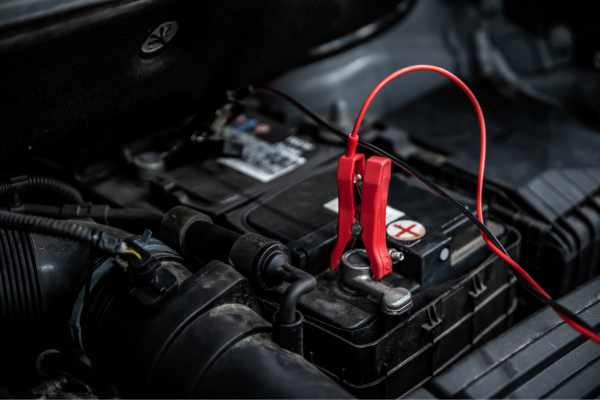Your vehicle’s battery plays a crucial role in powering various components, including engine startup and electrical systems operation. To ensure reliable vehicle ignition and smooth performance, it is imperative to maintain your car’s battery. In this comprehensive guide, we will delve into the significance of car battery maintenance, indications of a deteriorating battery, and approaches to maintaining it in optimal condition. For help with battery issues call our Oak Lawn car maintenance shop at 708-907-5673.
Understand the Importance
Proper maintenance of your car’s battery is indispensable as it facilitates the functioning of essential elements, from starting the engine to powering electrical systems.
Recognize Signs of a Failing Battery
Being aware of the signs that indicate a failing battery is vital in ensuring timely intervention and preventing unexpected breakdowns.
Steps to Maintain Optimal Condition
Adhering to specific steps, one can ensure the longevity and efficient performance of the car battery. By implementing these preventive measures, you can avoid potential inconveniences and costly repairs.
Regular Inspection
Inspecting your car battery on a regular basis is the initial step in maintaining it. Look for visible indications such as corrosion, rust, or harm to the battery casing. Pay special attention to the battery terminals to detect any signs of looseness or deterioration.
Battery Cleaning
Maintaining a strong connection requires cleaning your battery regularly. Utilize a wire brush or battery cleaner to eliminate corrosion and rust from the battery terminals. Ensure to wear protective gloves and safety glasses while dealing with chemicals.
Jumpstarting Your Car
Being knowledgeable about jumpstarting your car could be a life-saver if your battery becomes depleted. Familiarize yourself with the procedure, follow safety precautions, and always carry jumper cables in your vehicle.

Battery Testing
Testing the health of your car battery is essential. You can utilize a multimeter to measure its voltage or have a professional perform a load test. Understanding the condition of your battery enables you to take necessary action.
Battery Replacement
Even with proper maintenance, car batteries have a limited lifespan. Indications such as slow cranking or frequent jumpstarts serve as signs that it is time for a replacement. It is crucial to select a battery that aligns with the specifications of your vehicle.
Preventative Measures
Take preventive measures to prolong the lifespan of your battery. When experiencing extreme weather conditions, it is advisable to store your vehicle in a garage as excessive heat or cold can impact battery performance. If you anticipate leaving your car unused for an extended period, consider employing a trickle charger.
Maintenance Schedule
To keep your car battery in good condition, it is essential to establish a regular maintenance schedule. You should maintain a maintenance log to keep track of the inspection and cleaning dates. It is generally recommended to check the battery every three months.
Professional Assistance
Whenever you find yourself uncertain about any aspect of your car battery’s maintenance, it is advisable to seek professional assistance. Certified technicians possess the necessary expertise to conduct thorough battery tests and provide valuable advice. They can also ensure the safe disposal of old batteries, which should never be simply discarded in the trash.
Common Car Battery Problems
Your car’s battery is a vital component that ensures your vehicle starts and runs smoothly. However, like all car parts, batteries can experience issues over time. Here are some common car battery problems to be aware of:
- Dead Battery: A dead battery is one of the most common issues. It can happen due to leaving lights on, extreme weather conditions, or a battery reaching the end of its lifespan.
- Corrosion: Corrosion can develop on the battery terminals, causing poor electrical connections. Regularly cleaning and maintaining terminals can prevent this issue.
- Low Fluid Levels: Some car batteries have removable caps, allowing you to check the fluid levels. Low fluid can affect the battery’s performance, and topping it up with distilled water can help.
- Aging Battery: Car batteries have a limited lifespan, typically around 3 to 5 years. As they age, they become less reliable and may fail to hold a charge.
- Faulty Alternator: The alternator charges the battery while the engine runs. If it fails, the battery can drain quickly, leading to starting issues.
- Parasitic Drain: Certain electrical components, such as car alarms or infotainment systems, can draw power from the battery when the car is off, causing it to drain over time.
- Extreme Temperatures: Extremely cold or hot weather can affect a battery’s performance. Cold temperatures can reduce its capacity, while heat can cause fluid to evaporate.
- Loose or Damaged Cables: Loose or damaged battery cables can result in poor electrical connections and starting problems.
- Sulfation: Over time, lead sulfate crystals can build up on the battery plates, reducing its ability to hold a charge.
- Electrical Issues: Problems with the car’s electrical system, such as a malfunctioning starter or ignition switch, can mimic battery issues.
To prevent these problems, it’s essential to perform regular battery maintenance, including cleaning terminals, checking fluid levels (if applicable), and ensuring a secure connection. If you encounter persistent battery issues, it’s advisable to have your vehicle inspected by a qualified mechanic to identify and address the root cause.
We Can Help With Battery Issues
Maintaining your car battery regularly is crucial to ensure the smooth operation of your vehicle. By adhering to these guidelines and taking a proactive approach, you can avoid unexpected breakdowns and ensure reliable starts for your car. The importance of your vehicle’s battery should never be underestimated, as it serves as the heart of your car’s electrical system.